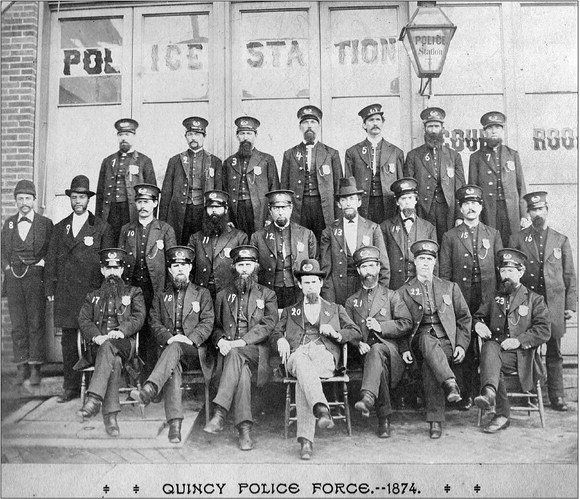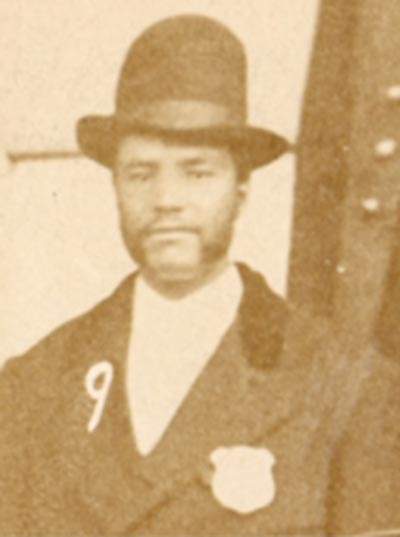First black policeman killed in line of duty

Quincy's first police patrol occurred in 1839. Since then, the force has lost five officers in the line of duty. One of them was William H. Dallas, who was also the first black police officer to lose his life in the line of duty in Quincy -- and the state of Illinois.
His story is both tragic and heroic, as he showed that through hard work and dedication, he could achieve his dreams. But tragically, that dream was cut short by a criminal's bullet.
Dallas was born into a slave family in South Carolina, sometime in the 1840s, though the exact date is not known. Dallas managed to escape and fled, eventually making his way to Quincy. He had heard of the good efforts of the community and particularly J.K. Van Doorn, which made Quincy a safe haven for escaped slaves. During the Civil War, Dallas joined the Union Army, was wounded, and honored for his role in battle, where he stood his ground during heavy firing. After the Civil War, Dallas married and had two sons. Not a great deal else is known about Dallas's life, except that he became a Quincy Police officer in 1874.

He was known as "Billy" and was, according to the Quincy Whig, "one of the best officers on the force." On May 29, 1876, Dallas and a fellow officer, O'Brien, were on the city's north side, where over the past several weeks a number of burglaries had occurred. The thieves had been operating late at night, plundering farms, and absconding with everything from chickens, wood and vegetables. The police department was in hot pursuit of the gang of marauders, and on that Monday night, received a tip from a citizen that aided their quest, though events turned tragic.
A Mr. Nathaniel Pease of Eighth and Sycamore (the present home of Washington Elementary School) went into his barn and noticed a stash of stolen goods and immediately notified the police. Officers Dallas and O'Brien were dispatched to the scene in the hope that they would be able to capture the criminals who had hidden the loot. Dallas and O'Brien staked out the barn and that night. After waiting for several hours, the two heard noises. Four men had entered the building but before they could get their hands on the stolen items, the officers shouted at them to halt. Instead, the intruders began shooting and Dallas and O'Brien returned fire, but, as far as they could tell, none hit the mark.
Dallas and his partner were unaware that one of the four burglars had gone under the barn--the structure was raised several feet-- until he fired three shots. One struck Dallas in the chin. The wounded officer was then hit by bullets from the other robbers and he fell to the ground. Thinking that Dallas had died from his wounds, O'Brien began chasing the burglars. Dallas, though severely wounded, had enough strength left to crawl to the Pease home, where help was summoned.
Dallas was taken to his home at 620 N. Ninth -- a home he and his wife had just purchased a month earlier -- where he was operated upon, though without success. Dallas was declared dead at 10 a.m. May 30, 1876.
The shooting death shocked the community. In the wake of Dallas's murder, a collection was raised to pay the mortgage for the home Dallas and his widow had so recently purchased. His funeral took place at the African Methodist Episcopal Church on the corner of Ninth and Oak. After the murder, the police launched a massive investigation to track down the culprits. However, all the dedication of the police force was to no avail. Several arrests were made but it was ascertained that those arrested were not party to the murder of Dallas. His murder remains unsolved.
William H. Dallas lived an extraordinary life. Born into slavery, he escaped, fought for the Union, and rose to become an officer of the law during a time when racial prejudice was the norm. His time in Quincy, therefore, is instructive. Our town has always had a reputation as a welcoming and friendly community, and Dallas's time in the Gem City shows that to be the case. Prior to emancipation, Dallas came to Quincy because it served as a place of refuge for runaway slaves. In the 1870s, though blacks were free, they were by no means equal, but Dallas's service as a police officer for the city is another testament to the city's enlightened views on race.
William H. Dallas is buried in Woodland Cemetery. Anyone wishing to learn more about his life and times can contact the Quincy Historical Society.
Justin P. Coffey is associate professor of history at Quincy University , where he specializes in recent American history and is the author of numerous articles. He also serves as president of the board of the Historical Society.
Sources
1. "City's first fallen officer was a black man and Civil War hero," Quincy Herald Whig, July 29, 1999, 12A.
2. "Startling Tragedy," Quincy Whig, June 1, 1876.
3. Ibid.
4. "Dallas", Quincy Whig, June 8, 1876.






